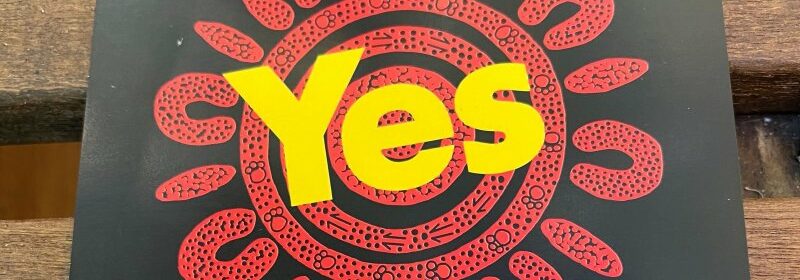Yes campaign sorely needs a champion

Save articles for later
Add articles to your saved list and come back to them any time.
Repeated polls this year have indicated a clear decline in support for the proposed constitutional change to enshrine a Voice to parliament. That should be deeply concerning for the many groups and individuals behind the Yes campaign.
It will be more worrying for the Aboriginal and Torres Strait Islander people who have fought so hard for a body that might carry their views to the highest levels of this nation.
The Yes campaign has not sustained momentum.Credit: Lisa Visentin
Since the 2017 Uluru Statement from the Heart, there have been countless high-level and grass-roots discussions, official reports and legal opinions, parliamentary inquiries and more about what form the Voice should take.
Yet too many Australians say they still do not understand it. Regaining widespread support is vital if Australia is to push ahead with its long and often difficult journey to achieve the goals demanded by our nation’s history.
While many organisations have expressed support – including top corporations and business lobby groups, sporting organisations, universities and medical and science research institutions – the Yes campaign has not sustained momentum. It appears somewhat fragmented and low-key. One drawback might be that the Yes campaign has lacked a central figurehead or a forceful, central driver for change.
By contrast, the No campaign has dominated headlines and has clear leaders: Opposition Leader Peter Dutton from the floor of parliament; the Coalition’s Indigenous Australians spokeswoman Senator Jacinta Nampijinpa Price; and Indigenous leader Nyunggai Warren Mundine. Price and Mundine have recently joined forces under the Fair Australia Banner as joint campaign spokespeople.
They appear to be of one mind of late, and have stuck several key messages, including: the Voice will create division – with Dutton claiming “instead of being ‘one’, we will be divided – in spirit, and in law; it will create chaos for the executive and trigger a stream of High Court challenges; and that there are more concrete ways of effective change for Indigenous people than having a panel of representatives in Canberra.
While those claims are in dispute, they may be cutting through with voters and must be challenged by supporters of the Yes vote if there is a hope of a successful referendum. But who is there to prosecute such arguments? It is not the role of Prime Minister Anthony Albanese, despite his passionate support for the Voice. And Indigenous Australians Minister Linda Burney has not positioned herself as the orator the Yes campaign sorely needs.
The Yes campaign must seek to establish a champion who can argue the case articulately and with passion.
Divisions in the Yes camp, including on the wording of the proposed change to the Constitution, have at times been unedifying and distracted from the Yes campaign’s core message.
Legal scholar Greg Craven argued the Voice should not be able to speak to executive government and fellow expert Father Frank Brennan said the constitutional amendment should be altered to “ministers of state”.
Those proposals were roundly rejected by other legal experts and Indigenous leaders including Megan Davis, Marcia Langton and Noel Pearson, who were part of the government’s working group.
Pearson, the esteemed academic and founder of the Cape York Institute for Policy and Leadership, is a powerful and eloquent proponent of the Voice. But he has indulged in some viciously divisive criticism of fellow Voice supporters, including calling respected Indigenous leader Mick Gooda a “bed wetter” when Gooda expressed public concern about the Yes campaign.
Who are we to listen to?
As The Age has reported, senior government and Indigenous figures who support the Voice to parliament have been frustrated by the pace of the Yes campaign’s mobilisation.
Yes23 director Dean Parkin has spoken of a large but decentralised community campaign already under way, with hundreds of Voice-related events across the country to take the debate out of Canberra and talk “o people in their own language”.
“This isn’t about directing organisations or telling them what to do,” he said. “It’s increasing as much as possible community-driven activity and tapping into a lot of the supporters who have been sitting there for a long time waiting to be involved.”
Separate from the Yes23 campaign effort, the government plans to ramp up its campaigning once the bill passes Parliament, using a series of high-profile Indigenous festivals and events to bring attention to the reconciliation push.
But this strategy may leave the run too late.
Without a clear leader or leaders to pursue the charge, the Yes campaign risks being wrecked by not doing enough either to alleviate fear or properly enunciate the pro-Voice rationale. A successful referendum requires support of more than 50 per cent of voters nationwide, and a majority of voters in a majority of states.
Legislation to enable the referendum is likely to return to the Senate next week, where the debate process will undoubtedly stir up more emotive debate. For now, though, the Yes campaign seems to be in a holding pattern.
Its supporters must hope there is a clear strategy to win over disaffected or undecided
voters because time is closing fast and there is too much to lose if it fails. The window of opportunity, the chance to seize the nation’s mood, only lasts so long, and that precious moment of time might now be lost forever unless the Yes campaign can regain momentum.
Patrick Elligett sends an exclusive newsletter to subscribers each week. Sign up to receive his Note from the Editor.
Most Viewed in National
From our partners
Source: Read Full Article
